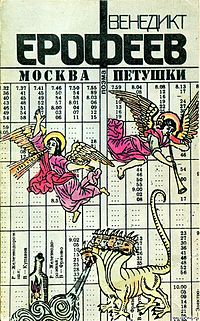- Moscow-Petushki
-
Moscow - Petushki 
Author(s) Venedict Yerofeyev Original title Москва - Петушки Country Soviet Union Language Russian Genre(s) Pseudo-autobiographic novel Publisher Self-published (Samizdat) Publication date 1970 (Samizdat) & 1973 (commercial release, in Israel) OCLC Number 37156277 Moscow-Petushki, also published as Moscow to the End of the Line, Moscow Stations, and Moscow Circles, is a pseudo-autobiographical postmodernist prose poem by Russian writer and satirist Venedikt Erofeev. Written between 1969 and 1970 and passed around in samizdat, it was first published in 1973 in Israel and later, in 1977, in Paris. It was published in the Soviet Union only in 1989, during the perestroika era of Russian history, in the literary almanac Vest' (Весть) and in the magazine Abstinence and Culture (Трезвость и Культура, Trezvost' i Kul'tura) in a slightly abridged form.
The story follows an alcoholic intellectual, Venya (or Venichka), as he travels by a suburban train on a 125 km (78 mi) journey from Moscow to visit his beautiful beloved and child in Petushki, a city that is described by the narrator in almost utopian terms.
At the start of the story, he has just been fired from his job as foreman of a telephone cable-laying crew for drawing charts of the amount of alcohol he and his colleagues were consuming over time. These graphs showed a clear correlation with personal characters. For example, for a Komsomol member, the graph is like the Kremlin Wall, that of a "shagged-out old creep" is like "a breeze on the river Kama", and Venya's chart simply shows his inability to draw a straight line because of the amount he has drunk. Venichka spends the last of his money on liquor and food for the journey. While on the train, he engages in lengthy monologues about history, philosophy and politics. He also befriends many of his fellow travellers and discusses life in the USSR with them over multiple bottles of alcohol.
The book is often seen as a critique on Soviet Russia and the restrictive lifestyles most Russians were forced to lead in Stalinist and post-Stalinist Russia. Erofeev saw this as symbolic of the state of the Soviet Union during the 1960s and 1970s.
See also
Links
- (Russian) e-Book
Categories:- 1970 novels
- Soviet novels
- Russian comedy and humour
- Novels set in Russia
Wikimedia Foundation. 2010.
